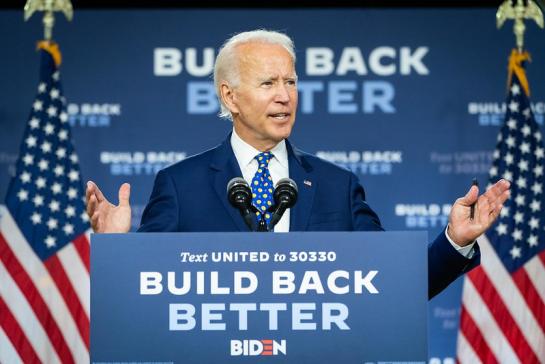Build Back Better Act

James Roosevelt Jr., FDR’s grandson, says we have a new New Deal on our hands: The Build Back Better Act. Some say it might ruin the economy of our country. No matter what you think of it, the spending bill will impact all our lives as we go out into the world, therefore, we should know what the Build Back Better Act is.
What is the Build Back Better Act?
The Build Back Better Act is a social safety net expansion plan proposed by President Joe Biden. The plan aims to invest in social programs, such as education, childcare, and health care, and invest in measures to fight the climate crisis. As a social safety net expansion plan, the main goal of the act is to improve the lives of families and individuals of the working class in the United States of America. The spending bill calls for around 2 trillion dollars to be invested in different areas.
The bill currently invests in fighting for climate change, institutes universal preschool programs, expands medicare, and extends the child tax credit. It also invests in paid family and medical leave, education, housing provisions, and reforming immigration in the United States. Additionally, it includes a state and local tax deduction, one of the measures instituted to ensure moderate Democrats vote for the act.
The House of Representatives passed the Build Back Better Act on Friday, November 19th. With a vote of 220 to 213, all Republicans opposed the bill. Now, the bill must be put up to vote in the Senate, where the supporters of the bill are hoping to have every Democrat’s vote, which may be hard to achieve when trying to appease both the progressive Democrats and the moderate Democrats. When put up to vote in the Senate, parts may be added or eliminated to ensure it passes with all votes from Democratic Senators. If this happens, the revised bill would have to be voted on in the House of Representatives again.
According to President Biden and the authors of this bill, the spending will not result in inflation, which is always a concern with large spending bills, because the Build Back Better Act will be paid for. Among the measures in the Act, a change in corporate taxes will bring in more revenue on the domestic and global stages, and wealthy Americans will see an increase in their taxes as well. Additionally, the spending bill includes investing in the IRS to ensure all Americans are rightfully paying their taxes.
However, a recent investigation by the Congressional Budget Office led by Republicans showed that if the provisions did not have expiration dates, the legislation would cause an increase in the deficit by $3 trillion in the next ten years. Democrats, on the other hand, are saying that there will be expiration dates to all provisions and will ensure the spending is paid for.
A large part of the bill that is a point of controversy is a tax deduction. This deduction, known as a SALT (state and local tax) cap, was reduced during the Trump administration. To appease moderate Democrats and get them to vote for the bill, the restoration of this tax
deduction was placed in the legislation. This tax cap limits the amount of local and state taxes one can deduct from federal taxes. By raising the limit, there would be less revenue for the federal government through taxes. Many progressive democrats are vehemently against this tax deduction, considering it benefits primarily wealthier individuals. Many are also saying that this tax deduction is one of the most expensive provisions within the bill.
Because of the complexity of the bill and the strong Republican opposition to the Build Back Better Act, Democrats would need to pass and enact the act through reconciliation, which means it would pass in the Senate with only Democratic support. Thus, the proponents of the bill are working hard to appease progressive and moderate Democrats.
How would this impact you?
If the bill is passed, there are different outcomes that could happen. If the bill is not paid for, and either the expiration dates lengthen or the plans Democrats have for paying for the bill fall through, then there would be inflationary pressure. Inflation would cause the purchasing power of individuals in this country to decrease and prices to increase. Inflation hurts those with fixed wages, lenders, and those who have cash savings, among others. Our economy might fall into a recession if the government does not do something to rectify the inflation if it happens.
On the other hand, if the bill is paid for, as most of the Democrats argue, and it continues successfully throughout the years, many people, especially in the working class, will have security with their jobs, children’s education, health care, and housing. There would be major structural changes to the way people live, as the provisions such as the universal pre-K and child tax credits will give the working class the security they need. More action would be taken in the fight against climate change, and hopefully this would result in improvements and bring us closer to saving the world from global warming. If the bill does not cause inflation to increase, and the provisions are successful, there would be an economic security blanket for us in case we need it.
This bill would change the way people live.
Disclaimer: Included is the information I felt to be relevant. However, there is much more information on the Build Back Better Act and there will continue to be more in the future. If you’d like to learn more, please research! Politics are ever-changing and this article is just one timestamp of the framework of this act.
Bibliography
Franck, Thomas. “Wall Street Economists Are Confident Biden’s Build Back Better Bill Will Become Law – and Boost Infrastructure Firms.” CNBC, 7 Dec. 2021, www.cnbc.com/2021/12/07/wall-street-believes-biden-build-back-better-bill-will-become-law.html.
Holtz-Eakin, Douglas Opinion Contributor. “Build Back Better Is Poor Policy Built on a Shaky Fiscal Foundation.” TheHill, 19 Nov. 2021, thehill.com/opinion/white-house/582339-build-back-better-is-poor-policy-built-on-a-shaky-fiscal-foundation.
Luhby, Katie Cnn Lobosco And Tami. “Build Back Better Bill: 10 Things You Didn’t Know – CNNPolitics.” CNN, 8 Dec. 2021, edition.cnn.com/2021/12/07/politics/biden-build-back-better-spending-bill/index.html.
Melissa, Melissa, and Kathryn Watson. “What’s in Democrats’ $1.75 Trillion Social Spending and Climate Bill?” CBS News, 18 Nov. 2021, www.cbsnews.com/news/bill-build-back-better-spending-bill-contents.
Pettinger, Tejvan. “Who Are the Winners and Losers from Inflation?” Economics Help, 8 Oct. 2021, www.economicshelp.org/blog/145181/inflation/who-are-the-winners-and-losers-from-inflation.
Raju, Lauren Cnn Fox And Manu. “CBO Issues Score on How Much Build Back Better Would Cost If Programs Were Permanent – CNNPolitics.” CNN, 11 Dec. 2021, edition.cnn.com/2021/12/10/politics/build-back-better-cbo-score/index.html.
Roosevelt, James, Jr. “Build Back Better Is a 21st Century New Deal.” TheHill, 20 Nov. 2021, thehill.com/opinion/white-house/582443-build-back-better-is-a-21st-century-new-deal.
“Summary of Cost Estimate for H.R. 5376, the Build Back Better Act.” Congressional Budget Office, 18 Nov. 2021, www.cbo.gov/publication/57627.
Your donation will support the student journalists of The Baldwin School of Puerto Rico. Your contribution will allow us to purchase equipment and cover our annual website hosting costs.
Hi! My name is Daria Figlus and I am in 12th grade. I was born in Chicago, lived in Ukraine, and moved to Puerto Rico nearly five years ago. I have been...










